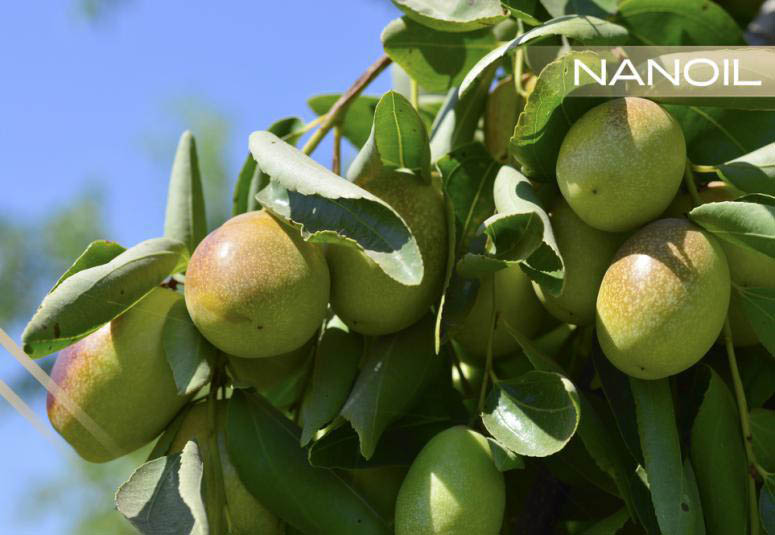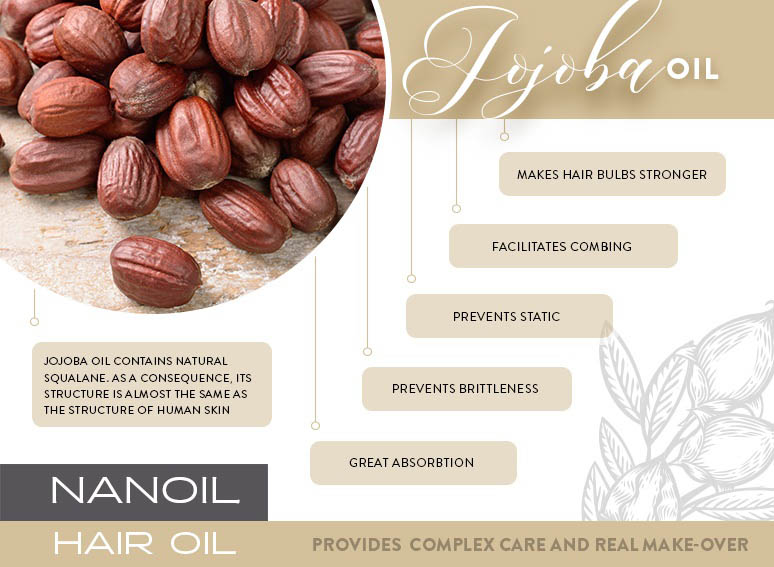- NANOIL Products
- Oils
- Face serums
- Hair masks
- Shampoos
- Hair conditioners
- Hair styling
- Care
- Hair Porosity Test
- Blog
- Contact

It has more in common with wax than with oils. But still – it can amaze with its properties. Jojoba oil is the source of nutrients – vitamins, squalane and fatty acids; excellently absorbed by the skin and resistant to rancidification. It is a natural sunscreen and has similar structure to human sebum. Jojoba oil is known as the desert gold extracted from the seeds of evergreen shrub.
Jojoba oil is not a typical oil, though it looks like one. It is liquid wax that is pressed from the seeds of jojoba shrub - Simmondsia Chinensis. The plant comes from organic crops in Central America. It can also be found in Australia, New Zealand, Africa and Asia but it is rather rare in these areas. The plant is grown in Spain as well but most jojoba-based products come from the vast Argentinian desert plantations. The evergreen jojoba shrubs conceal all their valuable properties inside the seeds.
50% of jojoba shrub seeds are made of fatty acids, therefore pressing the oil is troublefree. Cold-pressed jojoba seeds give golden oil nicely smelling of nuts. You should remember that only unrefined cold-pressed certified jojoba oil is a strongly-conditioning product. While choosing it, always check its qulity and extraction method, and if it's been refined. Other oils lose their nutrients.
Thanks to cold-pressing, jojoba oil keeps all qualities of natural Simmondsia Chinensis shrub. It is fluid at room temperature but it turns into wax at around minus seven degrees celsius. We should also mention that jojoba oil is extremely resistant to rancidification and keeps its qualities for a very long time. In practice, it has no expiry date because it keeps fresh long years. Therefore, jojoba oil brings effects not only when it is fresh-pressed.
If you wonder what makes argan oil and jojoba oil different, you must read on. They are really interesting products and have similar properties. It is a good idea to look for both in hair and skin care products. However, it is jojoba oil that contains natural squalane. As a consequence, its structure is almost the same as the structure of human skin. It is far better absorbed and improves hair condition more effectively. Depending on the ingredients that we look for in an oil, we decide on jojoba or argan.
What is jojoba oil made of? It is a natural source of vitamin E (speeds up repair and slows down cell ageing), vitamin A (enhances natural functioning of the skin), vitamin F (reinforces protective barrier on the skin), plant sterols, fatty acids, vitamin B complex and squalane (prevents inflammation and fights free radicals). Jojoba oil also owes its qualities to valuable minerals such as copper, zinc, selenium, iodine and chromium, as well as numerous EFAs, or essential fatty acids.
Natural jojoba oil has high biocompatibility with the skin. As a result, it is perfectly absorbed and so popular in face, body and hair cosmetics. It can work both as an independent cosmetic or an ingredient of homemade products and treatments. It is often included in face creams, body lotions, soaps and hair conditioners. Nanoil for medium porosity hair has also been enriched with natural finest quality jojoba oil. It works as a regulator and purifies the scalp. Interestingly, jojoba oil is also used as a basis for perfume to make the aroma longer-lasting.
It is antibacterial; if we add it to other cosmetics, it extends their durability. Jojoba oil is a multitasking beauty product which finds its place in:
If used regularly, jojoba oil delivers proper moisture, adds softness and elasticity. It is a great emollient that works for all skin types. Jojoba oil prevents dehydration, maintains acidic pH and moisturises dry skin. It reduces TWL - transepidermal water loss. On the other hand, it cleanses the skin and inhibits excessive sebum secretion in greasy skin. Moreover, jojoba oil repairs and soothes inflammation, therefore it is recommended for eczema and psoriasis treatment. It also works as a natural UV filter.

Nourishing qualities of jojoba oil are often used in hair care. What are jojoba oil's benefits for hair? It makes hair bulbs stronger, facilitates combing, prevents static and shields hair fibre from external factors, nourishes and controls level of moisture. It prevents brittleness and boosts shine. It is a good idea to massage jojoba oil in scalp because it penetrates the bulbs and enhances the functioning of hair follicles. What is more, it has anti-dandruff properties, soothes and keeps hair from getting greasy. It fulfils many functions as it helps dry as well as oily hair. The oil delivers moisture and locks water in dry hair. On the other hand, it controls sebaceous glands and prevents excessive sebum secretion in oily hair.
If you think that thanks to jojoba oil your highly porous hair will regain its excellent condition, you're right. It will surely work for medium and low porosity hair too. How so? Jojoba oil has interesting properties. It is wax, not a regular vegetable oil. Therefore, checking the content of fatty acids will not work in this case. It is a fluid plant wax that works for all hair types – damaged, dehydrated, splitting, difficult to style, etc.
Jojoba oil can be used in its pure form or as an addition to conditioning products. Remember that the oil must be natural, free from silicones, preservatives and perfume. It is the way of working that matters most – not colour or aroma. Jojoba oil’s benefits will be enhanced when we mix it with other oils e.g. argan, macadamia or coconut oil. Then, you will get full hair care and a real hair make-over.
Comments: #0